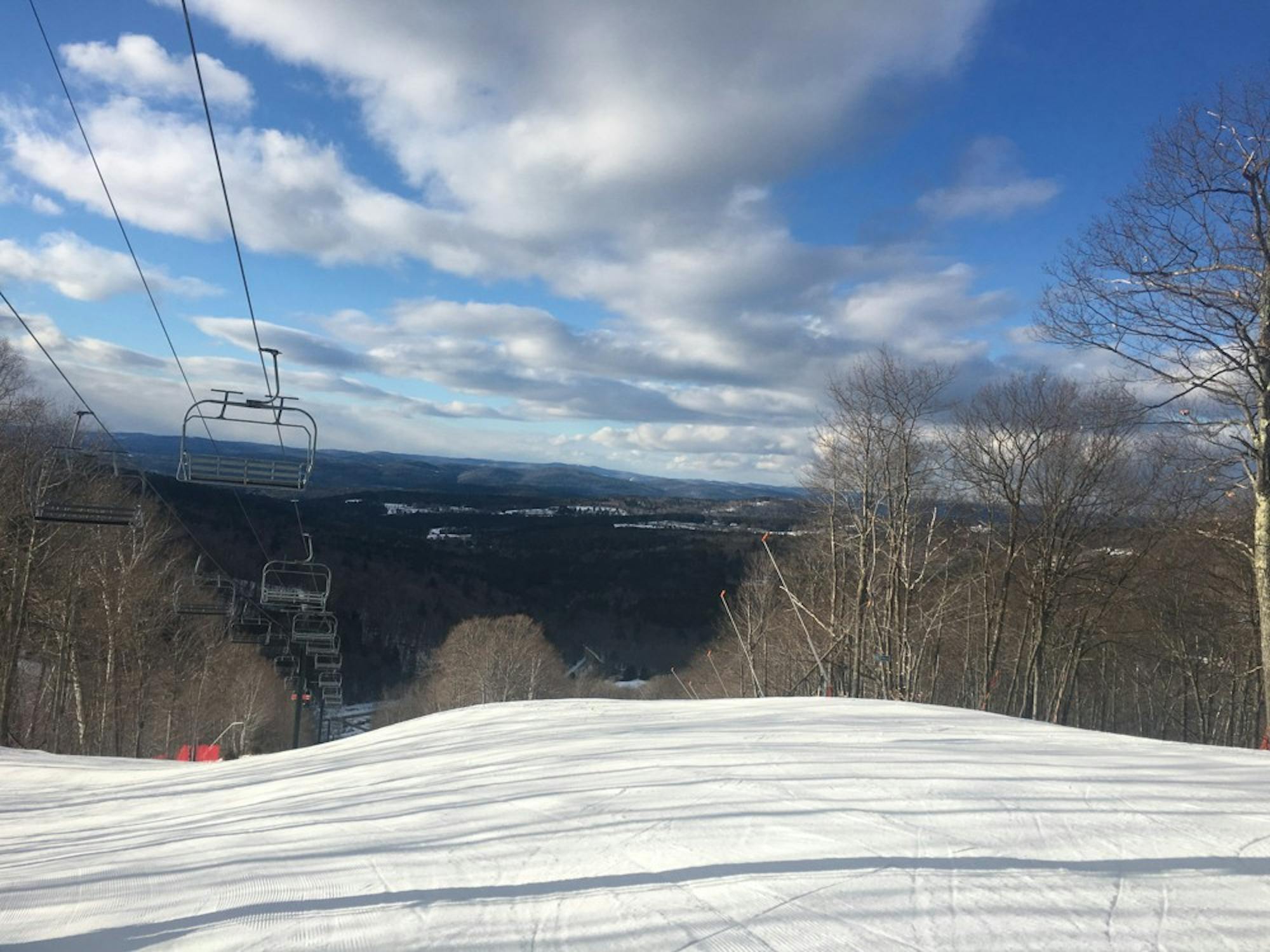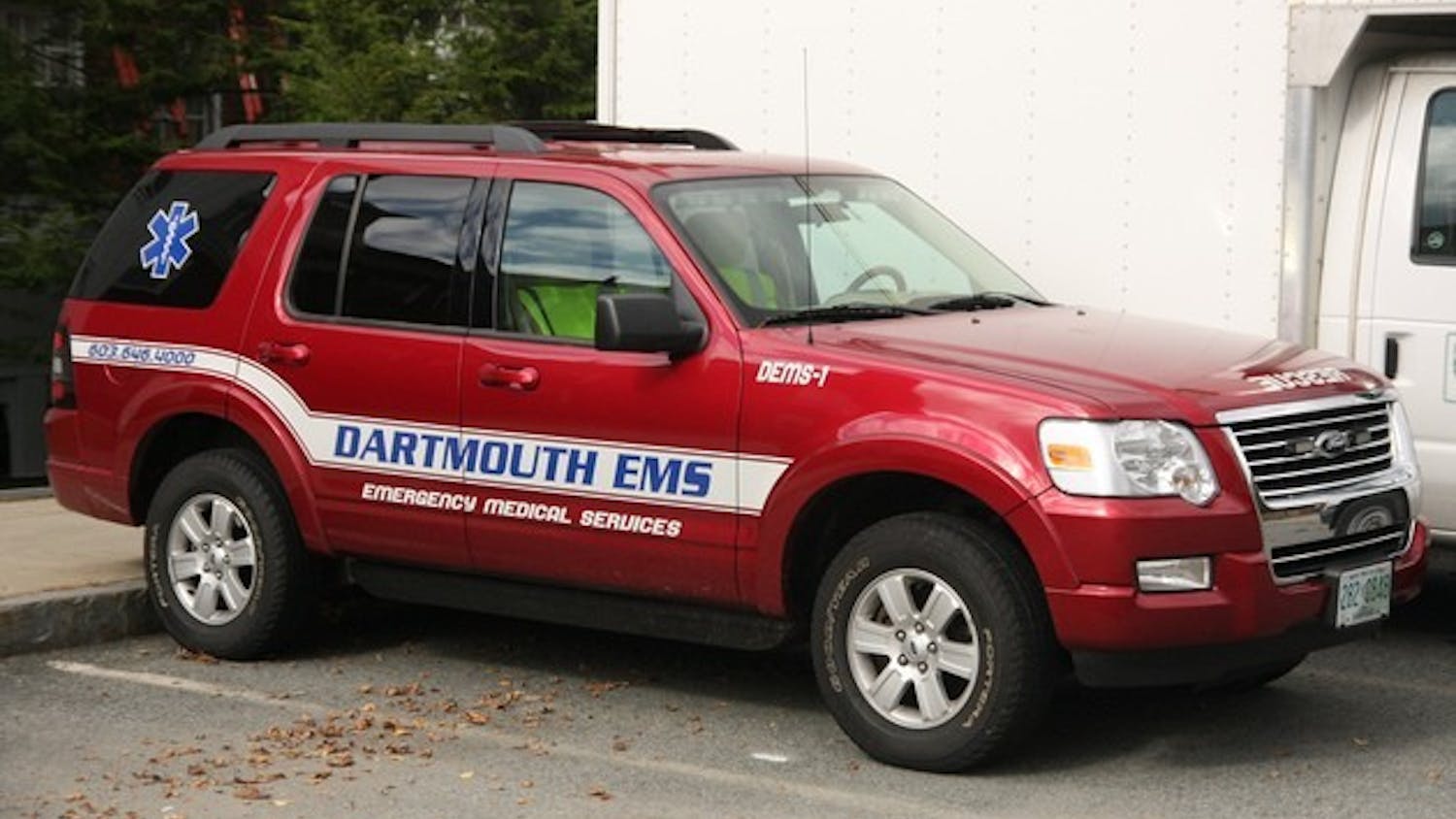As COVID-19 restrictions send students outdoors looking for fun, the Dartmouth Skiway has seen a particularly busy season this winter. High traffic on the slopes has meant an unusual term for Dartmouth Ski Patrol, the student organization that supplies the Skiway with patrollers to maintain the mountain and respond to medical emergencies.
One obstacle that Ski Patrol has faced is reduced staffing. While Ski Patrol normally has 60 members active any given winter term, the College’s staggered residence plan this academic year has meant that only 24 members of Ski Patrol have on-campus privileges.
Vanessa Haggans ’23, a vested (or fully qualified) patroller who is on campus this term, said that with fewer patrollers available, those who are on campus have had to make adjustments to ensure that the Skiway is adequately staffed. However, Haggans said she doesn’t mind the extra work.
“I think that we have all had to step up a little bit and take on some additional shifts,” she said. “We all really enjoy being at the Skiway, and we love what we do and feel so grateful for the opportunity to be there, and so for that reason it doesn’t feel as much of a burden as it could potentially be.”
Alongside a reduced staff, Ski Patrol has implemented new safety guidelines intended to minimize infection risk for both patrollers and Skiway patrons. The most prominent of these include restricted transport to the Skiway — only two patrollers are allowed in a car at a time — and having to spend more time out on the slopes as opposed to waiting in the patrol’s mountaintop shacks for a call. Ski patrollers also must adhere to social distancing and mask-wearing guidelines while responding to incidents.
“There [are] a whole new set of protocols for COVID specifically,” Haggans said. “[We are] trying to limit customer exposure in ways that we can while still providing care.”
Another way that Ski Patrol has helped patrollers and customers stay safe is by vaccinating patrollers working the slopes. Ski patrollers are health care workers according to New Hampshire guidelines, which made them eligible to receive the shots within the first vaccination wave.
Nathalie Korhonen Cuestas ’23, a vested patroller on campus, said the vaccine gave her “a lot of peace of mind.”
“To provide first-aid you have to be pretty close to people, and having one less thing to worry about so that we can provide appropriate aid is the most important thing for us,” she said.
The safety protocols that Ski Patrol has adopted this winter have not distracted from the main purpose of patrol: to quickly and effectively respond to incidents on the mountain. Nick Schoeller ’22, a vested patroller and the Ski Patrol equipment manager, explained that while the number of calls per shift varies, and most calls aren’t too serious, patrollers have to be ready to respond to anything.
“Any call could be a really serious call when you ski up to them, so [we] trust that everyone knows their [outdoor emergency care] well,” Schoeller said. “Throughout the season we do training on shift [and] practice all the skills to make sure we’re not getting rusty.”
However, providing first-aid to Skiway customers is only one part of the job. Ski Patrol is partially responsible for keeping the mountain safe for skiers, which means that while on shift, patrollers will put up signs to mark obstacles, open and clear trails that are safe and make decisions about which trails to close for the day. Skiway staff take care of other jobs, like operating chairlifts and grooming trails.
“A lot of what being a patroller is is getting the really practical stuff on the mountain done,” Korhonen Cuestas said. “There’s a lot of work that is done every day that I think people don’t necessarily realize. Even if we aren’t providing first-aid, there are lots of things we are doing all the time.”
Thus far, Ski Patrol has not taken any new members from the Class of 2024. In a normal year, the recruitment process would begin in fall term, when prospective freshmen members would take an outdoor emergency care course and go through a round of tests, including a ski test, before becoming patrol apprentices in the winter.
This year, instead of taking around 15 new apprentices in the fall, Ski Patrol has shifted its timeline. It plans to offer a hybrid OEC course in the spring for any interested ’24s, which would mean that both ’24s and ’25s would be apprentices next winter. Since the Skiway will close before spring term, assessing the skiing ability of prospective new members will be an obstacle.
“Obviously we won’t really be able to see their skiing until next winter,” Schoeller said, emphasizing that Ski Patrol wants to “make clear to people applying that there’s a certain level of skiing ability required.”
Another major change for Ski Patrol revolves around its traditional social scene. With COVID-19 restrictions and on-campus residence limitations, members have noted that the social aspect of the group has changed.
“I think all of us recognize the position we’re in,” Haggans said. “We are health care workers; we do not want to get COVID … and so as a result patrol has been incredibly COVID-safe this year.”
Instead of holding traditional events, which typically include hangouts and dinners after shifts, this year’s social activities have included doing runs up and down the slopes and getting meals with smaller groups of patrollers.
“[I’m] hopeful that next year sometime we can bring those [events] back — not let those old traditions disappear,” Schoeller said.
While Ski Patrol has faced a challenging winter term, its work goes on.
“I’ve been really impressed,” Haggans said. “I think out of all the organizations I’m a part of, I’m truthfully the most impressed with the way that Ski Patrol has been really taking it upon itself to maintain that mission of protecting the guests first.”




